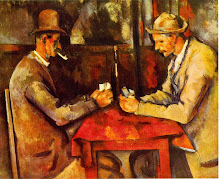In his preface to Amadeus Peter Shaffer discusses changing the end of Amadeus from something of "high melodrama" to an area "akin to tragedy." For me this really highlighted the importance of continuing "play" even during the revision process. Mentally I've been having trouble revising my plays because the initial writing of them was a creative and exciting process usually fraught with experimentation and giggling. Revision on the other hand seems like an impenetrably different beast––marked by plodding examination of each word. Or at least that's my mindset to it. I think though, that it not need be so. Shaffer here revises in broad swaths, obliterating and performing endings sometimes five different times a week. He even considers genre shifts an important part of the revision process. And indeed, it seems rather pretentious of me to believe my work worthy of word-by-word editing in the first draft, doing so implies that my piece is already thematically perfect. I am now inclined to take even "micro-editing" with a more playful bent. One can playfully add single lines that can dramatically change the whole play. What if we find out that the likable antagonist kicks puppies? Little things can change the audience's whole relationship to the play, but one need not change more than a second of what happens on-stage.
This can also serve to "bring-out" themes. Shaffer refers to any themes exposed by editing as bringing out existing themes, but I'm not so sure he's right about that. It seems as though themes of works can have a progression, not just an exposure. By making certain aspects of Amadeus more blatant, Shaffer notices other things in the play that he could draw out. But I wonder if what is really happening here is that by making aspects of the play more blatant, he is actually uncovering his intentions or own beliefs about what the play ought to be. Essentially, if we take it that when an artist intentionally puts a theme in his work he is leaving something intentionally unspoken for the audience to analyze/find/walk away believing, why not state that explicitly and then see what the piece really becomes about? As if it is left intentionally buried the artist perhaps is not rigorously examining the piece (Though I hate to say that because it's dangerously close to beginning to view creative writing as a spiritual or religious process with actions and changes the artist is required to undertake).
Lastly I'm glad to not be the only one who finds it necessary to add and not cut in my revisions. For some reason my initial creative process can sometimes prove obnoxiously concise. I am of the group that needs to be adding. My first drafts inevitably skeletal, seemingly especially in playwriting, where the writing is essentially economy – just dialogue and a few essential stage directions, but not needing anything else. Now, I don't think there's anything wrong with being concise, in fact I value it, but pacing is important, and I've probably rushed everything all semester. Shaffer decided that the last scene of Amadeus needed to be longer, because it contained all of Salieri's dynamicism.
Tuesday, April 20, 2010
Subscribe to:
Post Comments (Atom)

No one likes revising as much as writing. Sure. Though it does strike me that it's so much easier in so many ways. You'd think it would get more credit for that. The problem is the revision process is fueled by a different fire. It may be creative, but it rarely feels exciting. I don't know though -- there's something almost alchemical about taking your 'not working not there yet not doing what you want' text and making it brilliant. You stand back and go: whoa, I thought of that?! I am a freaking genius. This is because revision makes writing a two (thousand) step process -- what you can refine is so so so so so much better than what you can write the first time round. This is true no matter who you are, no matter how talented, and no matter how strong or how lousy draft one was. Now tell me that's not exciting.
ReplyDelete